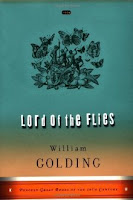Where Monsters Reside (Jennifer R. Hubbard)
Monsters are Other, the Other we fear.
Monsters are what—who—we don’t understand. Monsters are the enemy.
Lord of the Flies has always been one of my favorite books, because I believe one of its themes is this: Monsters are not external to us. Evil is not an outside force. We all have the capacity to be monsters, the capacity for evil. In Lord of the Flies, they call evil “The Beast,” and they think they can identify it in a single entity that can be killed. But the real beast is within them; the real danger is unleashing their own potential for violence. The real danger is their ruthless response to their own fears.
 Monster stories show us this: the beast intent on hurting us, the beast who must be conquered. It is a zombie, or a vampire, or a giant lizard, or even just a blob. It is a killer shark, or an evil genius, or a wicked witch, or a vengeful ghost. It makes us feel good, and temporarily safe, to think that evil can be consolidated in one form and destroyed, ended, overcome.
Monster stories show us this: the beast intent on hurting us, the beast who must be conquered. It is a zombie, or a vampire, or a giant lizard, or even just a blob. It is a killer shark, or an evil genius, or a wicked witch, or a vengeful ghost. It makes us feel good, and temporarily safe, to think that evil can be consolidated in one form and destroyed, ended, overcome.
But there is always another beast to replace that one.
A subset of monster stories lets us see the good within the alleged monster. King Kong has his gentle side. Beauty’s Beast has inner nobility. The Cullens have trained themselves not to hunt people. If the monster is not wholly evil, then the monster is just like us: a mix of selfless and selfish impulses, a mix of love and hatred.
Certainly there are characters, and people, who behave monstrously, whose actions must be checked. They have stopped checking their own actions, have allowed the beast inside to take over. Our only mistake is in thinking of them as wholly Other, as monolithic embodiments of evil completely separate from ourselves.
Our responsibility is to keep an eye on our own inner monsters.
Monsters are what—who—we don’t understand. Monsters are the enemy.
Lord of the Flies has always been one of my favorite books, because I believe one of its themes is this: Monsters are not external to us. Evil is not an outside force. We all have the capacity to be monsters, the capacity for evil. In Lord of the Flies, they call evil “The Beast,” and they think they can identify it in a single entity that can be killed. But the real beast is within them; the real danger is unleashing their own potential for violence. The real danger is their ruthless response to their own fears.
 Monster stories show us this: the beast intent on hurting us, the beast who must be conquered. It is a zombie, or a vampire, or a giant lizard, or even just a blob. It is a killer shark, or an evil genius, or a wicked witch, or a vengeful ghost. It makes us feel good, and temporarily safe, to think that evil can be consolidated in one form and destroyed, ended, overcome.
Monster stories show us this: the beast intent on hurting us, the beast who must be conquered. It is a zombie, or a vampire, or a giant lizard, or even just a blob. It is a killer shark, or an evil genius, or a wicked witch, or a vengeful ghost. It makes us feel good, and temporarily safe, to think that evil can be consolidated in one form and destroyed, ended, overcome.But there is always another beast to replace that one.
A subset of monster stories lets us see the good within the alleged monster. King Kong has his gentle side. Beauty’s Beast has inner nobility. The Cullens have trained themselves not to hunt people. If the monster is not wholly evil, then the monster is just like us: a mix of selfless and selfish impulses, a mix of love and hatred.
Certainly there are characters, and people, who behave monstrously, whose actions must be checked. They have stopped checking their own actions, have allowed the beast inside to take over. Our only mistake is in thinking of them as wholly Other, as monolithic embodiments of evil completely separate from ourselves.
Our responsibility is to keep an eye on our own inner monsters.


That phrase "inner monsters" is chilling...
ReplyDelete